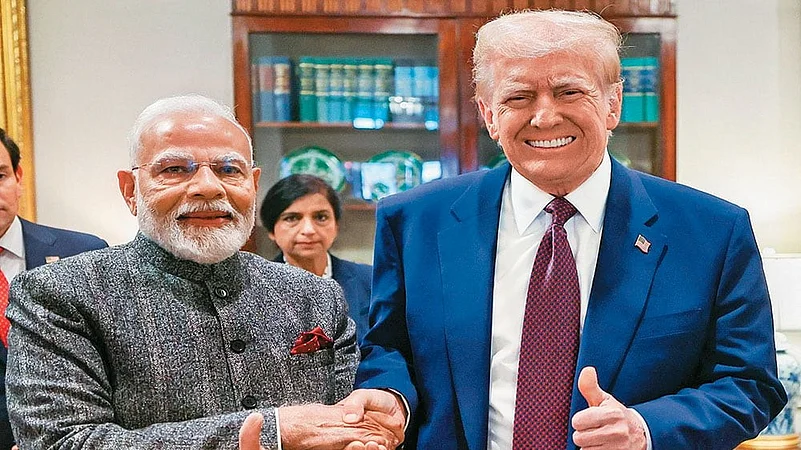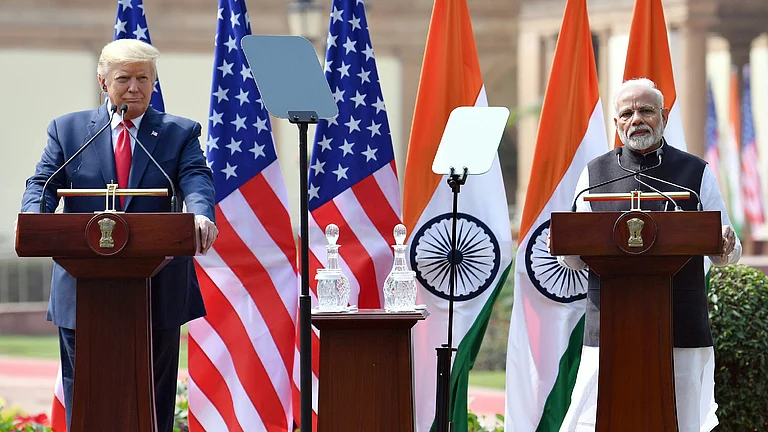President Donald Trump has said that the US is close to making a trade deal with India, as his administration started sending letters detailing the levies that Washington will impose on products from those countries entering America.
"Now, we've made a deal with the United Kingdom, we've made a deal with China...We're close to making a deal with India,” Trump said on Monday.
"Others we met with and we don't think we're going to be able to make a deal, so we just send them a letter. If you want to play ball, this is what you have to pay." His remarks came as the US extended the suspension of its April 2 reciprocal tariffs until August 1, providing a three-week time for India and the US to resolve their pending issues.
Last week, Commerce Minister Piyush Goyal said that India does not enter into any trade agreement based on deadlines and will accept the proposed trade deal with the US only when it is fully finalised, properly concluded and in the national interest.
The high tariffs announced by the US on April 2 were suspended by the Trump administration till July 9.
The agriculture and dairy sectors are difficult and challenging areas for India to give duty concessions to the US. India has not opened up dairy in any of its free trade pacts signed so far.
Trump's remarks came as his administration sent out the first tranche of “letters” to various countries on Monday detailing the tariffs that the US will impose on products from those countries entering America.
India was not included in the list of countries that received tariff letters from the Trump administration on Monday.
The countries that got these letters, signed by Trump, were Bangladesh, Bosnia and Herzegovina, Cambodia, Indonesia, Japan, Kazakhstan, Lao People's Democratic Republic, Malaysia, Serbia, South Africa, South Korea, Thailand and Tunisia.
"We're sending out letters to various countries telling them how much tariffs they have to pay,” Trump said.
He added that the countries were “ripping” the US and “were charging us tariffs at levels that nobody's ever seen before. We have some countries that were charging 200% tariffs and making it impossible to do business.
“And what the tariffs are doing is they're driving people in and companies into the United States,” he said while speaking to reporters ahead of a dinner with Israeli Prime Minister Benjamin Netanyahu in the White House on Monday.
Trump also repeated the claim that he stopped the war between India and Pakistan by telling the two neighbours that Washington would not do trade with them if they continued the fighting.
“We did a job with India and Pakistan, Serbia, Kosovo, Rwanda and the Congo, and this was all over the last three weeks or so… and others that were ready to fight,” Trump said.
“And we stopped a lot of fights. I think the very big one, frankly, a very, very big one, was India and Pakistan. And we stopped that over trade," he said.
"We said we're not going to be dealing with you at all if you're going to fight. And they were maybe at a nuclear stage. They're both nuclear powers. And I think stopping that was very important,” Trump added.
At the dinner, Netanyahu presented Trump with a letter that he had sent to the Nobel Prize Committee nominating Trump for the Nobel Peace Prize.
Previously, Trump has bemoaned that he won’t get a Nobel Peace Prize for stopping the war between India and Pakistan or for his efforts in the Russia-Ukraine, and Israel-Iran conflicts.
Since May 10, Trump has repeated more than a dozen times his claim that he “helped settle” the tensions between India and Pakistan and that he told the nuclear-armed South Asian neighbours that America would do a “lot of trade” with them if they stop the conflict.
India launched Operation Sindoor on May 7, targeting terrorist infrastructure in territories controlled by Pakistan in response to the Pahalgam terror attack.
The strikes triggered four days of intense clashes that ended with an understanding on stopping the military actions on May 10.
New Delhi has been maintaining that India's fierce counter-attack that day forced Pakistan to plead for ending the hostilities.
































